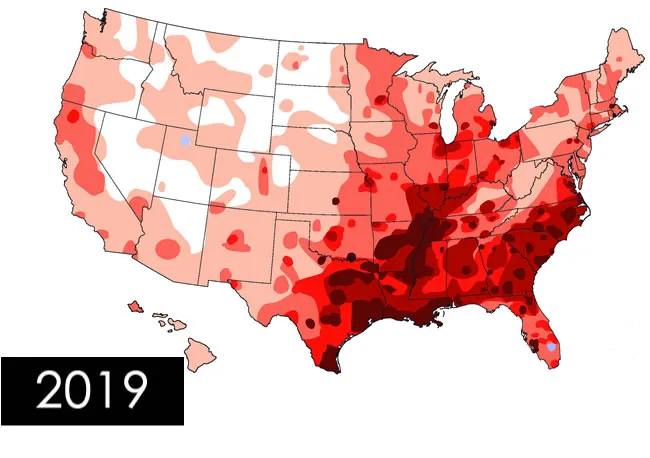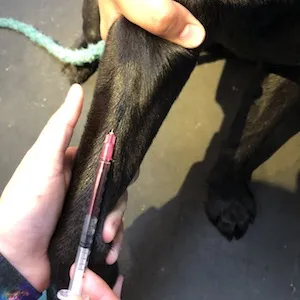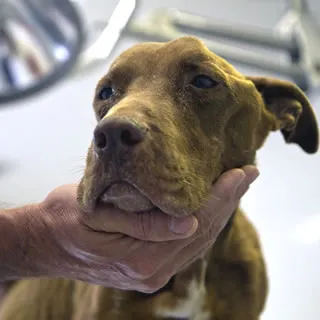Heartworm disease is a severe and potentially fatal condition that impacts our beloved canine and feline companions. Understanding the Symptoms Of Heartworms In Dogs And Cats is crucial for early detection and effective management, helping pet owners protect their furry family members from this widespread parasitic threat. Transmitted by mosquitoes, these foot-long worms can cause significant damage to the heart, lungs, and associated blood vessels, leading to chronic health issues and even death if left untreated. This comprehensive guide will delve into the intricacies of heartworm disease, highlighting the distinct signs to watch for in both dogs and cats, the transmission process, prevention strategies, and available treatment options.
What is Heartworm Disease?
Heartworm disease is a serious parasitic infection caused by Dirofilaria immitis, commonly known as heartworms. These thread-like worms reside in the heart, lungs, and surrounding blood vessels of infected animals, leading to severe lung disease, heart failure, and damage to other vital organs. While primarily affecting dogs, cats, and ferrets, heartworms can also infect other mammals, including wolves, coyotes, foxes, sea lions, and, rarely, humans. Given the proximity of wild carriers like foxes and coyotes to urban areas, they pose a significant risk as reservoirs for the disease.
Heartworm Disease in Dogs
Dogs are considered natural hosts for heartworms, meaning the parasites mature into adults, mate, and reproduce within their bodies. Without intervention, the number of worms can escalate, with some dogs harboring hundreds of worms. The presence of heartworms causes lasting damage to the heart, lungs, and arteries, impacting a dog’s long-term health and quality of life even after the parasites are gone. This makes prevention paramount, and when treatment is necessary, it should be administered as early as possible to minimize irreversible damage. For those seeking comprehensive protection against various parasites, explore flea worm and mite treatment for dogs.
Heartworm Disease in Cats
Heartworm disease manifests quite differently in cats compared to dogs. Cats are atypical hosts, and most heartworms in felines do not survive to the adult stage. Cats with adult heartworms typically host only one to three worms, and many affected cats have no adult worms at all. This often leads to heartworm disease going undiagnosed in cats. However, it’s vital to recognize that even immature worms inflict significant harm, causing a condition known as Heartworm Associated Respiratory Disease (HARD). Unlike dogs, cats cannot be treated with the same medication used for canine heartworm infections, emphasizing that prevention is the only way to protect cats from this dangerous disease.
 Illustration of parasitic heartworms in pet organs, causing damage to the heart and lungs.
Illustration of parasitic heartworms in pet organs, causing damage to the heart and lungs.
The Heartworm Life Cycle: How Infection Occurs
The mosquito is an indispensable link in the heartworm life cycle. Adult female heartworms residing in an infected animal (dog, fox, coyote, or wolf) produce microscopic offspring called microfilaria, which circulate in the bloodstream. When a mosquito bites an infected animal and ingests blood, it picks up these microfilariae. Over a period of 10 to 14 days, within the mosquito, these baby worms develop and mature into “infective stage” larvae.
Subsequently, when an infected mosquito bites another unsuspecting dog, cat, or susceptible wild animal, these infective larvae are deposited onto the animal’s skin surface. They then enter the new host through the mosquito’s bite wound. Once inside the new host, it takes approximately six months for these larvae to fully mature into adult heartworms. Adult heartworms can live for five to seven years in dogs and up to two or three years in cats. Due to the long lifespan of these parasites, each mosquito season can contribute to an increasing worm burden in an infected pet, exacerbating the disease’s severity.
Symptoms of Heartworms in Dogs
In the initial stages of heartworm infection, many dogs show minimal or no symptoms of heartworms in dogs. However, as the infection progresses and the worm burden increases, clinical signs become more apparent. Dogs that are very active, heavily infected, or have pre-existing health conditions are more likely to display pronounced symptoms.
Common symptoms of heartworms in dogs may include:
- Mild, Persistent Cough: Often mistaken for a kennel cough or other respiratory ailments, a chronic dry cough, especially after exercise, is a hallmark sign.
- Reluctance to Exercise: Dogs may become unusually tired after moderate activity, showing reduced stamina during walks or playtime.
- Fatigue and Lethargy: A general decrease in energy levels and increased sleeping.
- Decreased Appetite and Weight Loss: Unexplained weight loss and a noticeable reduction in food intake.
- Swollen Belly: As heartworm disease advances, it can lead to heart failure, causing fluid accumulation in the abdomen (ascites), which manifests as a swollen-looking belly.
In severe cases, typically when a dog harbors a large number of heartworms, a life-threatening complication known as caval syndrome can occur. This condition involves a sudden blockage of blood flow within the heart and is marked by:
- Sudden onset of labored breathing
- Pale gums
- Dark, bloody, or coffee-colored urine
Caval syndrome is a medical emergency requiring prompt surgical removal of the heartworm blockage. Without immediate intervention, few dogs survive this critical stage. For more in-depth information, you can also refer to existing resources on signs and symptoms of heart worm in dogs.
Symptoms of Heartworms in Cats
Identifying symptoms of heartworms in cats can be particularly challenging due to their unique response to the parasite. As atypical hosts, cats often have fewer worms, and many infections don’t reach the adult stage. This means standard heartworm tests designed to detect adult worm proteins might return false negatives. However, even immature worms cause significant damage, primarily leading to Heartworm Associated Respiratory Disease (HARD).
The symptoms of heartworms in cats can be vague, intermittent, and easily confused with other feline ailments like asthma, bronchitis, or even hairballs. These symptoms may include:
- Coughing: Similar to dogs, a persistent cough is a common sign.
- Asthma-like Attacks: Cats may experience difficulty breathing, wheezing, and rapid breathing, mimicking feline asthma.
- Vomiting: Chronic or intermittent vomiting, sometimes unrelated to eating, can be a sign.
- Decreased Appetite and Weight Loss: A general decline in appetite and gradual weight loss.
- Lethargy: Reduced activity levels and increased sleep.
- Sudden Collapse or Death: Sadly, some cats show no outward signs until they suddenly collapse or die due to a severe reaction to the parasites or damage to vital organs. This is often the first and only indicator of heartworm disease in felines.
- Difficulty Walking (Ataxia): In rare cases, neurological signs may occur.
Because of the atypical nature of heartworm infection in cats and the potential for severe outcomes, prevention is the only truly effective strategy. There are currently no approved treatments for adult heartworm infections in cats, making early detection of even vague symptoms, and consistent prevention, critically important.
Risk Factors for Heartworm Infection
The risk of your pet contracting heartworm disease is influenced by several factors, even if your local area does not seem to have a high incidence. Heartworm disease is constantly spreading to new regions, and your community might have a higher prevalence than you realize. Additionally, traveling with your pet to endemic areas can increase their exposure.
 2019 heartworm incidence map showing risk areas for pets in the United States.
2019 heartworm incidence map showing risk areas for pets in the United States.
Key risk factors include:
- Geographic Location: Heartworm disease has been diagnosed in all 50 states of the U.S. and many other countries worldwide. Coastal regions and areas along river tributaries often have higher rates due to favorable conditions for mosquitoes.
- Climate Variations: Temperature and humidity levels directly impact mosquito populations and the development rate of heartworm larvae within mosquitoes.
- Presence of Wildlife Carriers: Stray and neglected dogs, as well as wildlife such as coyotes, wolves, and foxes, act as reservoirs, sustaining the parasite’s life cycle.
- Mosquito Presence: The sheer number and species of mosquitoes in an area play a significant role. Mosquitoes can also be carried long distances by wind.
- Pet Relocation: The movement of infected pets to previously uninfected areas can rapidly spread the disease.
- Indoor vs. Outdoor Pets: While outdoor pets are at higher risk, indoor pets are not entirely safe as mosquitoes can easily enter homes.
Given the unpredictable nature of these variables and the widespread presence of heartworm disease, the American Heartworm Society recommends a “Think 12” approach: (1) get your pet tested every 12 months for heartworm, and (2) administer heartworm preventive medication 12 months a year.
The Importance of Annual Heartworm Testing
Heartworm disease is a progressive condition, and the earlier it is detected, the better the chances of a successful outcome for your pet. Since early symptoms of heartworms in dogs and cats are often subtle or non-existent, regular testing by a veterinarian is critically important.
The heartworm test requires only a small blood sample from your pet. It works by detecting the presence of heartworm proteins (antigens produced by adult female worms in dogs) or antibodies (indicating exposure in cats). Some veterinarians perform these tests in their clinic, while others send samples to diagnostic laboratories. In either case, results are typically obtained quickly. If your pet tests positive, your veterinarian may recommend further diagnostic tests, such as X-rays or ultrasound, to assess the extent of the disease and plan the most appropriate course of action.
Heartworm Testing Guidelines for Dogs
Testing procedures and optimal timing for heartworm tests can vary slightly between dogs and cats. For dogs, annual testing for heartworm infection is recommended for all canines, often performed during routine preventive care visits.
Here are specific guidelines regarding testing and timing for dogs:
- Puppies under 7 months: Puppies can typically begin heartworm prevention without a prior heartworm test. This is because it takes at least six months for a dog to test positive after initial infection, as the worms need time to mature and produce the detectable antigens. However, puppies should be tested six months after their initial veterinary visit, again six months later, and annually thereafter to confirm they remain heartworm-free.
- Adult dogs over 7 months of age and previously not on prevention: These dogs must be tested for heartworm infection before starting any preventive medication. Following the initial negative test, they should be retested six months later, then 12 months later, and annually thereafter.
- If there has been a lapse in prevention: If your dog misses one or more doses of monthly preventive, or if doses are given late, they should be tested immediately. Another test should be performed six months later, followed by annual testing.
 Veterinarian drawing a blood sample from a dog for heartworm disease testing.
Veterinarian drawing a blood sample from a dog for heartworm disease testing.
Annual testing is crucial, even for dogs consistently on year-round heartworm prevention. While heartworm medications are highly effective, they are not 100% foolproof. Missed or late doses can leave your dog vulnerable, and sometimes dogs might spit out or vomit pills, or topical medications might not be fully absorbed. Regular testing acts as a safety net, ensuring that any breakthrough infection is detected early before significant damage occurs. Without annual testing, you wouldn’t know your dog needs treatment until symptoms are advanced, making treatment more difficult and risky.
What to Expect if Your Dog Tests Positive for Heartworms
Receiving a heartworm positive diagnosis for your dog can be distressing, but the good news is that most infected dogs can be successfully treated. The primary goals of treatment are to stabilize your dog’s condition, eliminate all adult and immature worms, and minimize potential side effects.
Here’s what you should expect if your dog tests positive for heartworms:
- Confirm the Diagnosis: After an initial positive antigen test, your veterinarian will usually recommend a confirmatory test, often a different type of antigen test or a microfilaria test. Heartworm treatment is complex and expensive, so confirming the diagnosis with absolute certainty is essential before proceeding.
- Restrict Exercise: This is a critical step. As soon as a positive diagnosis is confirmed, your dog’s physical activity must be severely restricted. Physical exertion increases the rate at which heartworms cause damage to the heart and lungs. The more severe your dog’s symptoms, the more stringent the exercise restriction will need to be. This often means leash walks only and avoiding any strenuous play.
- Stabilize Your Dog’s Condition: Before the actual heartworm treatment (adulticide therapy) can begin, your dog’s overall health may need to be stabilized. This can involve medications to manage symptoms like coughing, inflammation, or heart failure. In severe cases, or if your dog has other serious medical conditions, this stabilization phase can take several months.
- Administer Treatment: Once your veterinarian determines your dog is stable and ready, they will recommend a specific treatment protocol. The American Heartworm Society provides comprehensive guidelines for these treatment plans. Dogs with no or mild signs of heartworm disease (such as a cough or exercise intolerance) generally have a high success rate with treatment. Dogs with more severe disease can also be successfully treated, though the risk of complications is higher. It’s important to note that the severity of outward symptoms doesn’t always correlate with the number of worms; dogs with many worms may show few or no signs early in the disease.
- Follow-up Testing and Prevention: Approximately six months after the completion of treatment, your veterinarian will perform another heartworm test to confirm that all heartworms have been eliminated. To prevent re-infection, it is crucial to administer heartworm preventive medication year-round for the remainder of your dog’s life.
 Dog resting in a cage recovering after heartworm treatment and exercise restriction.
Dog resting in a cage recovering after heartworm treatment and exercise restriction.
Understanding Heartworm Prevention
Heartworm prevention is arguably the most critical aspect of managing this disease. Various preventive medications are available, working to eliminate the immature stages of the heartworm parasite, effectively breaking the life cycle before adult worms can establish themselves.
How Monthly Heartworm Preventives Work
Whether your chosen preventive is an oral pill, a spot-on topical medication, or an injectable, all FDA-approved heartworm medications function by targeting and eliminating the immature (larval) stages of the heartworm parasite. This includes the infective larvae deposited by mosquitoes and the subsequent larval stages that develop inside the animal.
It’s crucial to understand that immature heartworm larvae can molt into an adult stage in as little as 51 days. Once they reach this adult stage, they cannot be effectively eliminated by preventive medications. This underscores the paramount importance of administering heartworm preventives strictly on schedule (monthly for oral and topical products, and every six or twelve months for injectables). Administering prevention late allows immature larvae to progress to the adult stage, making them much harder, if not impossible, to eliminate with preventives.
 Veterinarian discussing heartworm prevention medication options with a pet owner.
Veterinarian discussing heartworm prevention medication options with a pet owner.
When to Start Your Dog on Heartworm Prevention
Puppies are just as susceptible to heartworm disease as adult dogs. The American Heartworm Society recommends that puppies begin heartworm preventive medication as early as the product label allows, ideally no later than eight weeks of age.
The dosage of heartworm medication is determined by body weight, not age. Puppies grow rapidly, and their growth rate varies significantly among breeds. This means a young animal can quickly gain enough weight to move from one dosage range to the next within a few weeks. It’s advisable to consult your veterinarian for guidance on anticipating dosage changes. If your pet is on a monthly preventive, you might consider purchasing only one or two doses at a time if a dosage change is expected. Ensure you bring your pet for every scheduled well-puppy exam to stay current on all health issues, including heartworm protection. Always confirm the correct heartworm preventive dosage by having your pet weighed at each visit.
Important Questions About Heartworm Disease & Prevention
Do I Need a Prescription for My Pet’s Heartworm Preventive Medication?
Yes, absolutely. The U.S. Food and Drug Administration (FDA) requires that heartworm preventives be used “by or on the order of a licensed veterinarian.” This means you must obtain heartworm preventives directly from your veterinarian or with a valid prescription through a pet pharmacy.
Prior to prescribing a heartworm preventive, veterinarians typically perform a heartworm test to ensure your pet is not already carrying adult heartworms. Administering preventives to an already infected pet can, in rare instances, lead to severe and potentially fatal reactions due to the sudden death of microfilariae circulating in the bloodstream. It is generally not necessary to test very young puppies or kittens before starting preventives, as it takes approximately six months for heartworms to develop to adulthood and be detectable. If the initial heartworm testing is negative, prevention medication is prescribed. While there might be searches for heartworm medication for dogs over the counter, it is crucial to understand that effective and safe heartworm prevention is strictly prescription-based due to these risks.
 Veterinary examination room where a vet checks a dog before prescribing heartworm medication.
Veterinary examination room where a vet checks a dog before prescribing heartworm medication.
Is There an Effective Natural Prevention for Heartworm?
Currently, only heartworm prevention products that have been thoroughly tested and proven effective by regulatory bodies like the U.S. Food and Drug Administration (FDA) should be used. There is no scientifically proven or FDA-approved “natural” method that effectively prevents heartworm disease. Relying on unproven natural remedies can leave your pet unprotected and at severe risk.
Is There a Vaccine for Heartworm Disease?
No. At this time, there is no commercially available vaccine for the prevention of heartworm disease in dogs or cats. While research scientists are exploring this possibility, the only reliable way to prevent heartworm disease is through the regular and appropriate use of veterinarian-prescribed preventive medications. These medications are available in various forms, including once-a-month chewables, once-a-month topicals, and once- or twice-a-year injections. Discuss with your veterinarian to determine the best option for your pet, as many of these medications also offer the added benefit of preventing other common parasites.
Are Heartworms More Common in Certain Areas of the United States?
Heartworms have been found in all 50 states of the U.S., although the risk level varies significantly by region. High-risk areas often include large regions near the Atlantic and Gulf coasts, as well as along major river tributaries. Most states also have “hot spots” where the infection rate is much higher compared to other parts of the same state.
Factors influencing the local risk of heartworm infection include:
- Climate: Temperature and humidity affect mosquito breeding cycles and the rate of larval development.
- Mosquito Species: The types of mosquitoes present in an area and their biting habits.
- Breeding Areas: The presence of standing water where mosquitoes can lay eggs.
- Animal Reservoirs: The local population of infected dogs, foxes, or coyotes.
How Long Should My Dog Be on Heartworm Prevention in Northern States?
For a variety of reasons, the American Heartworm Society now recommends a year-round heartworm prevention program, even in regions with cold winters. Heartworm cases have been diagnosed in nearly every county in states like Minnesota, and the duration of the mosquito season can vary within a single state. Moreover, mosquito species are continually adapting to colder climates, and some can successfully overwinter indoors.
Year-round prevention is considered the safest and most effective approach. This continuous protection safeguards against seasonal fluctuations, unpredictable weather patterns, and the possibility of indoor mosquito exposure. Furthermore, many heartworm preventives also offer protection against intestinal parasites, which can pose significant health risks to both pets and humans, making year-round protection a valuable component of overall pet health.
What Causes a Dog to Die from Heartworm Disease?
Heartworm disease is complex and can severely affect multiple vital organs, including the heart, lungs, kidneys, and liver. The outcome of infection varies greatly among patients. The adult worms primarily cause inflammation of the blood vessels and can physically block blood flow, leading to pulmonary thrombosis (blood clots in the lungs) and ultimately heart failure. Given that heartworms can grow to be “foot-long” parasites, the damage they inflict can be extensive and severe.
Advanced heartworm disease can also result in liver or kidney failure. Dogs exposed to a large number of infective larvae simultaneously are at a significant risk of sudden death due to a massive influx of developing larvae overwhelming the vascular system. Other animals may live for extended periods with only a few adult heartworms and show no clinical signs until faced with an environmental stressor, such as an extreme increase in temperature, or another significant health problem that exacerbates their underlying condition.
 Close-up view of a dog’s heart severely infected with adult heartworms.
Close-up view of a dog’s heart severely infected with adult heartworms.
Can I Still Use Heartworm Medication Past Its Expiration Date?
No. As with all drugs or pharmaceutical products, heartworm preventives must be used before the expiration date indicated on the package. It is impossible to predict whether the medication will retain its full effectiveness or safety once it has expired. The expiration date is established through a series of rigorous tests mandated by regulatory bodies like the U.S. Food and Drug Administration, providing assurance that the product remains effective and has not undergone any significant deterioration within that timeframe. Using expired medication risks leaving your pet unprotected and susceptible to heartworm infection.
What Should I Do If I Missed Two Months of My Dog’s Heartworm Prevention?
If you have missed two months or more of your dog’s heartworm preventive medication, you must consult your veterinarian immediately. You should restart your dog on their monthly preventive as soon as possible, and then schedule a retest six months later. The reason for this retesting schedule is that heartworms need approximately seven months to mature enough for an infection to be reliably diagnosed by standard antigen tests. This waiting period ensures that if an infection occurred during the lapse in prevention, it will be detectable. Prompt action and veterinary guidance are crucial to protect your dog.
Conclusion
Understanding the symptoms of heartworms in dogs and cats is a critical responsibility for every pet owner. While signs can be subtle, especially in cats, recognizing early indicators like a persistent cough, reduced stamina, or unexplained weight loss can make a significant difference in your pet’s prognosis. Heartworm disease is a severe, progressive condition with potentially devastating consequences for both canines and felines, but it is also highly preventable.
Regular veterinary check-ups, consistent annual heartworm testing, and year-round administration of veterinarian-prescribed preventive medications are the cornerstones of protection. By prioritizing prevention and staying vigilant for any potential symptoms, you can safeguard your beloved pets from the dangers of heartworm disease and ensure they live long, healthy, and happy lives. Always consult your veterinarian for personalized advice and the best preventive strategy for your individual pet.
References
- American Heartworm Society. (Various years). Official Website (Information adapted from resources on heartworm disease in dogs and cats).
